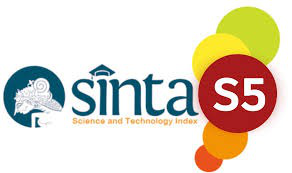Arduino Uno Programming Training for Senior High School in the City of Tasikmalaya
Abstract
This study aims to program basic Arduino UNO. First, we create an Arduino simulation circuit to turn on the Light Emitting Diode (LED) in the Proteus software. Next, make Arduino programming for the running LED. Finally, enter the Arduino program into the Arduino circuit on Proteus. This Arduino UNO programming training will be introduced to teachers in online training activities. With this training, it is hoped that teachers will be able to increase innovation and creativity in the subjects taught,
Keywords
Full Text:
PDFReferences
Abel Jr, A. (2020). The phenomenon of learning at a distance through emergency remote teaching amidst the pandemic crisis. Asian Journal of Distance Education, 15(1), 127-143.
Dubey, P., & Pandey, D. (2020). Distance learning in higher education during pandemic: challenges and opportunities. Int. J. Indian Psychol, 8(2), 43-46.
Dubey, A. D., & Tripathi, S. (2020). Analysing the sentiments towards work-from-home experience during covid-19 pandemic. Journal of Innovation Management, 8(1), 13-19.
Foti, P. (2020). Research in distance learning in Greek kindergarten schools during the pandemic of COVID-19: Possibilities, dilemmas, limitations. European Journal of Open Education and E-learning Studies, 5(1), 1-12.
Jusas, V., Butkiene, R., Venčkauskas, A., Burbaite, R., Gudoniene, D., Grigaliūnas, Š., & Andone, D. (2021). Models for administration to ensure the successful transition to distance learning during the pandemic. Sustainability, 13(9), 4751.
Machado Júnior, A. J., & Pauna, H. F. (2020). Distance learning and telemedicine in the area of Otorhinolaryngology: lessons in times of pandemic. Brazilian Journal of Otorhinolaryngology, 86, 271-272.
Marsya, R. F., Mudzakir, A., & Khoerunnisa, F. (2020, March). Investigating pre-service chemistry teachers’ view of the nature of science and technology for organic light-emitting diodes learning. In Journal of Physics: Conference Series (Vol. 1521, No. 4, p. 042071). IOP Publishing.
Nadeak, B. (2020). The effectiveness of distance learning using social media during the pandemic period of covid-19: A case in universitas kristen indonesia. International Journal of Advanced Science and Technology, 29(7), 1764-1772.
Nolan, A., White, R., Soomro, M., Dopamu, B. C., Yilmaz, M., Solan, D., & Clarke, P. (2021, September). To work from home (WFH) or not to work from home? Lessons learned by software engineers during the COVID-19 pandemic. In European Conference on Software Process Improvement (pp. 14-33). Springer, Cham.
Olentsova, J. A. (2020, November). Distance learning in Russia during the coronavirus pandemic. In Journal of Physics: Conference Series (Vol. 1691, No. 1, p. 012219). IOP Publishing.
Oktavia, R., & Halim, A. (2018, September). Light Emitting Diode (LED) as an essential prop component for STEM education in the 21st century: A focus for secondary school level. In Journal of Physics: Conference Series (Vol. 1088, No. 1, p. 012060). IOP Publishing.
Prestiadi, D., Zulkarnain, W., & Sumarsono, R. B. (2019, December). Visionary leadership in total quality management: efforts to improve the quality of education in the industrial revolution 4.0. In The 4th International Conference on Education and Management (COEMA 2019) (pp. 202-206). Atlantis Press.
Peloso, R. M., Ferruzzi, F., Mori, A. A., Camacho, D. P., Franzin, L. C. D. S., Margioto Teston, A. P., & Freitas, K. M. S. (2020). Notes from the field: concerns of health-related higher education students in Brazil pertaining to distance learning during the coronavirus pandemic. Evaluation & the Health Professions, 43(3), 201-203.
Purwanto, A., Asbari, M., Fahlevi, M., Mufid, A., Agistiawati, E., Cahyono, Y., & Suryani, P. (2020). Impact of work from home (WFH) on Indonesian teachers performance during the Covid-19 pandemic: An exploratory study. International Journal of Advanced Science and Technology, 29(5), 6235-6244.
Rayuwati, R. (2020). How educational technology innovates distance learning during pandemic crisis in remote areas in Indonesia?. International research journal of management, IT and social sciences, 7(6), 161-166.
Sambas, A., Gundara, G., & Ula, S. (2019). Pelatihan Robotika Berbasis Android Untuk Menumbuhkan Inovasi dan Kreativitas di SMP 11 Bandung. Martabe: Jurnal Pengabdian Kepada Masyarakat, 2(1), 8-12.
Sudrajat, D., Achdisty, M., Kurniasih, N., Mulyati, S., Purnomo, A., & Sallu, S. (2019, December). The implementation of innovation in educational technology to improve the quality of website learning in industrial revolution era 4.0 using waterfall method. In Journal of Physics: Conference Series (Vol. 1364, No. 1, p. 012044). IOP Publishing.
Vázquez-Córdova, S., Ramos-Ortiz, G., Maldonado, J. L., Meneses-Nava, M. A., & Barbosa-García, O. (2008). Simple assembling of organic light-emitting diodes for teaching purposes in undergraduate labs. Revista mexicana de física E, 54(2), 146-152.
Vu, T. L. A., & Le, T. Q. (2019). Development orientation for higher education training programme of mechanical engineering in industrial revolution 4. 0: a perspective in vietnam. J. Mech. Eng. Res. Dev, 42(1), 68-70.
DOI: https://doi.org/10.46336/ijeer.v2i3.319
Refbacks
- There are currently no refbacks.
Copyright (c) 2022 Aceng Sambas, Gugun Gundara, Mujiarto Mujiarto, Volodymyr Rusyn, Aan Andriana, Faisal Abdul Aziz
Published By:
IJEER: Jalan Riung Ampuh No. 3, Riung Bandung, Kota Bandung 40295, Jawa Barat, Indonesia
IJEER Indexed By:
 This work is licensed under a Creative Commons Attribution 4.0 International License.
This work is licensed under a Creative Commons Attribution 4.0 International License.









